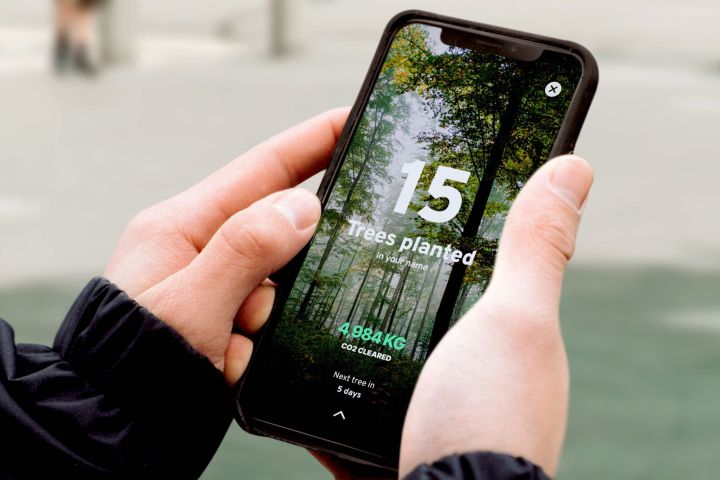
The average American burns twice as much fossil fuel as a typical European. So what does it take to go from a super-polluting American to a more eco-friendly French person? Just go vegan, give up your car, and never fly again.
At least, that’s what I found when I tried Klima: A new app that invites you to pay a monthly amount to offset your carbon footprint. The more you put into the atmosphere (both directly or indirectly), the more you owe.
For example, if you shop a ton and live in a mansion, you might need to pay $26 a month to offset the negative environmental impact that those things have on the planet. On the other hand, a vegetarian in a tiny home who only owns a bike might only need to fork over $7.
Where does that money go? Klima, together with its partners ClimatePartner and Co2ol, uses your monthly fee to fund environmental projects such as tree planting and solar panel installations, which help to offset your carbon footprint. The company isn’t a non-profit, though; 70% of your payment goes to the projects, while 10% goes to Klima’s operating costs and 20% goes to education and outreach.

To calculate your footprint, the app takes you through a variety of aspects of your life. Do you take a lot of plane rides? Are they long or short trips? Are you vegan? Can your shopping trips be classified as luxury? While the queries are fairly easy to answer, that means some nuance can be lost, like whether you’re driving a gas-guzzling SUV or a more fuel-efficient model. (You can indicate if you have an electric car, though.) “We wanted to stay away from questions where you need to put down your phone and kind of look something up in your documents,” Markus Gilles, Klima’s co-founder, told Digital Trends.
Other important factors, like your income, also aren’t taken into account. The app is launching in 18 countries, using a baseline for energy type, although in the U.S. electricity sources vary by state. Your area’s climate will also determine whether you’re blasting an air conditioner or heater several months out of the year, but the app doesn’t ask for your zip code. The idea isn’t to give you a dead-on number but ballpark it and let you pay for your pollution. The Nature Conservancy has a much more detailed calculator, though you might not know the amount of your yearly electricity bill off the top of your head.
The whole process for getting my tons of carbon emissions was straightforward but revealed some limitations. When I started hitting the plus sign on the flights page — pretending this was a normal year, when in reality I haven’t flown since January — a pop-up told me that my employer is responsible for offsetting my work trips. If you work for a company that participates in a carbon offset program, great. If not, it kind of speaks to the larger problem with an app like this.

Most people want to do their best when it comes to climate change. They want to turn the lights off when they leave a room and shut off the water when brushing their teeth. But buying a more efficient washer or electric car isn’t feasible for a lot of people. And an extra $20 a month is beyond many people’s budgets.
“I think climate change, the climate crisis is such an urgent and pressing topic that we need to act on all levels of society,” said Gilles. There are obviously roles for individuals to play. But when your country’s administration is rolling back environmental regulations left and right, a plan to go meatless three times a week may feel small and futile.
That being said, Klima’s format does let you get an idea of how certain changes will affect your overall footprint. You can watch the number rise and fall as you add and subtract flights or change your diet. “We’ve really tried to focus on long-term lifestyle commitments rather than, like, daily tracking,” said Gilles.
Ultimately, of course, it’s better for the environment to avoid emitting carbon in the first place than to try and undo the damage afterwards.


